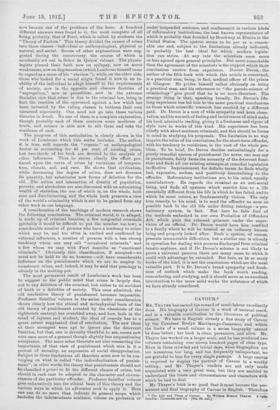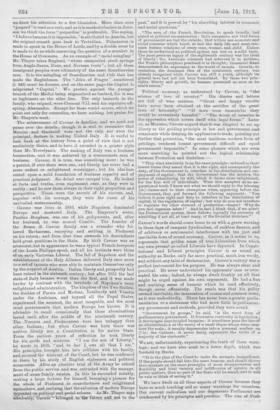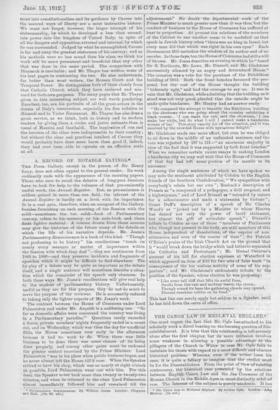CAVOUR.*
Ma. THAYER has earned the reward of much labour excellently done. His biography of Cavour is a work of unusual merit, and is a valuable contribution to the literature of political science. We have in English already a fine study of Cavour by the Countess Evelyn Martinengo-Cesaresco, and within the limits of a small volume in a series biography cannot be done better ; her book is clear, persuasive, and alive. Mr. Thayer has worked on a larger scale, and he has produced two volumes containing over eleven hundred pages of close type. Even in these crowded and trivial days, when biographies are too numerous, too long, and too frequently unimportant, we are grateful to him for every single passage. A large canvas is required to display the portrait of Cavour in a worthy setting ; and Mr. Thayer's readers are not only made acquainted with a very great man, but they are enabled to understand the times and circumstances and characters with whiCh he had to deal.
Mr. Thayer's book is so good that it must become the per. Moment and final biography of Cavour in English. "Therefore
• The Ws and Times of Cutout.. By William Roscoe Thayer. $ Toby London : Constable and Co. 181s. dd. nat..]
we-draw his attention to a few blemishes. More than .once "jeopard" is used as a verb, and as it is marked obsolete in John- son we think the form " jeopardize" is preferable. The saying, " I believe because it is impossible," is attributed to Anselm, but the original remark goes back to Tertullian. Palmerston is made to speak in the House of Lords, and by a double error he is made to do so while answering the question of a member in the House of Commons. As an example of " racial mingling " Mr. Thayer takes England, "whose unequalled stock springs from Anglo-Saxon, Dane, and Norman roots " ; but all these immigrant peoples were ultimately of the same Scandinavian race. It is the mingling of Scandinavian and Celt that has made the Englishman. The "John of Prague" .mentioned (i. 343) must be Jerome, and on the same page the Capitol is misprinted " Capital." We protest against the younger branch of the Medici being stigmatized as bastard, for it was as legitimate as the elder line. The only bastards in the family, who reigned, were Clement VII. and his repulsive off- spring, Alessandro. 'Except for these venial errors, which we point out only for correction, we have nothing but praise for Mr. Thayer's work. •
The achievement of Cavour is familiar, and we need not pause over the details ; though it is well to remember that Mazzini and Garibaldi were not the only, ,nor even the principal, factors in making United Italy. It is useful to look back at the history from a point of view that is not exclusively theirs, and to have it recorded in a quieter style than Mr. Trevelyan's. The making of Italy was a business transaction, and it was achieved by .a consummate man of business. Cavour, it is true, was something more : ho was a patriot, if ever there were one, and liberty has never had .a more ardent or enlightened worshipper ; but his idealism rested upon a-solid foundation of business capacity and of practical judgment. No detail ever escaped him. He looked at facts and truths, even unpleasant ones, as they were in reality ; and he saw them always in their right proportion and perspective. These were the secrets of his success, and, together with his courage, they were the cause of his unrivalled statesmanship.
Cavour was born in 1810, while Napoleon dominated Europe and mastered Italy. The Emperor's sister, Pauline Boeghese, was one of his god-parents, and, after her husband, he was named Camillo. • The founder of the Benso di Cavour family was a crusader who fol- lowed Barbarossa, marrying and settling in Piedmont on his return; and from that time onwards his descendants held groat positions in the State. By birth Cavour was an aristocrat, but in appearance he was a typical French bourgeois of the Louis Philippe epoch, and all his instincts were those of an early Victorian Liberal. The fall of Napoleon and the establishment of the Holy Alliance delivered Italy once more to, a•set of tyrants .who were able to maintain themselves only by the support of Austria. Italian liberty and prosperity had been ruined iu the sixteenth century; but after 1815 the last state, of Italy became worse than the first, and it was made harder by contrast with the interlude of Napoleon's more enlightened administration. The kingdom of the Two Sicilies, the duchies of Parma and Modena, Lonibardy and Venetia under the Austrians, and beyond all the Papal States, experienced the meanest, the most incapable, and the most cruel governments that modern Europe has known. It is advisable to recall occasionally that these abominations lasted until after the middle of the nineteenth century. The ,Tuscans and Piedmontese were less unhappy than other Italians ; but when Cavour was born there was neither liberty nor a Constitution in his native State. From the . earliest years of reflection he took liberty for his guide and mistress. "I am the son of liberty," he wrote in 1860, "and to her I.: owe all that 'I am." His principles brought him into collision with his family, and secured the Mistrust of the Court,: but he was confirmed in them by his study of English statesmen and political economists. After. an abortive trial of the Army he retired from the public service and was entrusted.With the manage- ment of seine family estates. In this he succeeded notably, making a large fortune for himself, becoming a pioneer for the whole: of rPidmont in manufactures and enlightened agrioulture, and realizing that the salvation of modern Europe 4,pode4 ti cal and social science. As Mr..Thayer says ,..a-Mirrtbry;'‘Uu.vetirw" belOnged- to the attire and not to the past," and it is proved by " his absorbing interest in economic. and social questions."
"The men of the French Revolution, to speak broadly, bad aimed at political reconstruction : their successors saw that forms, of government are but the outside ; that within are economic and social concerns which touch at last the daily life and most inti-' mate human relations of every man, woman, and child Unless. these be understood no political system can rest on a solid basis. The most precious legacy of the eighteenth century was the ideal of liberty : the American colonists had achieved it in politics ;. the French philosophers practised it in thought; Immanuel Kant. demonstrated its supremacy in the world of morals. Growth, or evolution, the dominant idea of the nineteenth century, was already recognized while Cavour was still a youth, although its general laws had not yet been formulated. By these two prin- ciples, liberty and growth, he became possessed as soon as he could reason.'
'Political economy, as understood by Cavour, is "the, science of love of country." His diaries and letters. are full of wise maxims. "Great and happy results.'
have never been obtained at the sacrifice of the great laws of humanity." "if laws were immutable they would be excessively harmful." " The worst of miseries itx the oppression which covers itself with legal forme." Later on, as Minister, Cavour argued that it•was illogical to set up' liberty as the guiding principle in law and government andt conscience while denying its application to trade, pointing out further that protection, "the most insidious modern form DE privilege, rendered honest government difficult and equal, government impossible." In some phrases which are even more searching he pointed out the logical relationship. between Protection and Socialism :-
" They start absolutely from the :mine principle: reduced to their' lowest terms they assert that it is the right, and consequently the' duty, of the Government to interfere in the distribution and em- ployment of capital ; that the Government has the mission, the power of substituting its will, which it dooms more enlightened,. for the free will of individuals. Were this accepted as an un-. questioned truth I know not what we should reply to the laboring- [Sic] classes and to their champions when, appearing before the Government, they put forward the following argument : You: believe it your right, and duty to interfere in the distribution of capital, in the regulation of capital ; but why do you not interferer to regulate the other element of production—wages ? Why do. you not organize labor ?' And in fact.I think that, if we admit the Protectionist system, there follows logically the necessity of: admitting if not all, at least many, of the Socialist doctrines."
Cavour's words should come home to us with a grave warning in these days of rampant Syndicalism, of reckless finance, and of arbitrary or sentimental interference with the , just anci inevitable laws of sound economy. Cavour, as it seems to us,. represents that golden mean of true Liberalism from which, our own present so-called Liberals have departed. In Consti-
tutional and Liberal principles Cavour is as sound an authority as Burke, only far more practical, much less wordy, and without.any taint of declamation. Cavour's oratory was rt., perfect instrument for his purpose. He,was always clear an practical. He never understated his opponents' case or over- stated his own ; indeed, he always dwelt frankly on all that might be urged rCgainet his own arguments. He had a fine
and scathing sense of humour which he used effectively. though never offensively. The result was that his policy seemed inevitable, the incarnation of reason and common sense,. as it was undoubtedly. There has never been a greater parlia- mentarian or a statesman who had more faith in parliament- ary government and methods, provided they were sound.
"Government by groups," he said, "is the worst form of' parliamentary government. It frustrates continuity in legislation ; it encourages unprincipled bargains; it sometimes puts the fate OF an administration at the mercy of a small clique whose votes may the scale ; it usually degenerates into a personal warfare orn
[?in] the Cabinet; it never fairly represents the views of It. majority of the electorate."
We are, unfortunately, experiencing the truth of these warn- ings; and 'we have also sunk to a lower depth, which was foretold by Burke.
"It is the plan of tho Court to make its servants insignificant. If the people should fall into the same humour, and should chooser their servants on the same principles of mere obsequiousness and flexibility and total vacancy and indifference of opinion in all public matters, then no part of the State will be sound, and it fwill be vain to think of saving it."
We have dwelt on all these aspects of Cavour because they have so much teaching and so many warnings for ourselves. Our current radicalism and our degenerate Parliament are condemned by his piinciplee and practice. The rise of Pied+
mont into constitutionalisnrand its' gnidence by Cavour into Clio assured ways of liberty are a most instructive history. We must not forget, however, the larger triumph of his statesmanship, by which lie developed a loss than second- rate power into the kingdom of United Italy, in spite- of all the dangers and opposition, external and internal, by which he was surrounded. Judged by what he accomplished, Cavour is far and away the greatest statesman of his century; and as his methods were no less sound than his aims, wo think his work will be more permanent and beneficial than any other that was done in the same period. The comparison with :Bismarck is inevitable ; and Mr. Thayer has written some of his best pages in contrasting the two. He also understands, far better than- most writers, the Roman Court and the 'Temporal Power. He distinguishes both of them clearly from that Catholic Chinch which they have enslaved and mis- used for their own purposes. The many pages that Mr. Thayer gives to this interesting subject are well worth pondering: Excellent, too, are his portraits of all the great actors in the drama of Italy's resurrection, especially his fine tributes to Ricasoli and to Victor Emmanuel. Mr. Thayer has also done a great service, as we think, both to history and to modern readers by giving them a cooler and juster estimate than is sumal of Mazzini and Garibaldi. The inspiration of one and the heroism of the other were indispensable to their country ; but without the clear and practical intellect of Cavour they would probably have done more harm than good if, indeed, they had ever been able to operate on an effective scale at all.












































 Previous page
Previous page